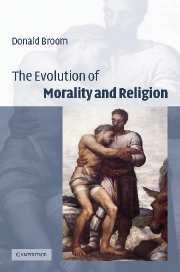Book contents
- Frontmatter
- Contents
- Preface
- Acknowledgements
- 1 Concepts and codes of living
- 2 Cooperation, altruism, reciprocal altruism
- 3 Biological capabilities needed for altruism and morality
- 4 Ideas about morality
- 5 The origins and value of religion
- 6 Other views about the origins of morality and religion
- 7 Social and political consequences of this biological view of morality and religion
- 8 Conclusions
- References
- Species list
- Author index
- Subject index
4 - Ideas about morality
Published online by Cambridge University Press: 18 December 2009
- Frontmatter
- Contents
- Preface
- Acknowledgements
- 1 Concepts and codes of living
- 2 Cooperation, altruism, reciprocal altruism
- 3 Biological capabilities needed for altruism and morality
- 4 Ideas about morality
- 5 The origins and value of religion
- 6 Other views about the origins of morality and religion
- 7 Social and political consequences of this biological view of morality and religion
- 8 Conclusions
- References
- Species list
- Author index
- Subject index
Summary
WHAT IS RIGHT AND WHAT IS WRONG?
Most people would say that an understanding of what is right or good and what is wrong or evil is fundamental to the way in which they decide what to do in life. It is, therefore, the key issue in philosophy. Brandt (1996, p. 1) presents three goals of ethical theorising:
[first] to ascertain which states of affairs are desirable in themselves (and how desirable they are); second, to determine which sorts of actions are morally right or wrong, praiseworthy or blameworthy; and third, to ascertain whether a commitment to always doing the morally right thing is desirable from the point of view of the agent's own well-being.
In many writings from the past on this subject and in some today, no clear distinction is made between social, political, legal and religious meanings of right and wrong. This is not just because of poor quality thinking, the borderlines between these meanings are vague and some attempts to make sharp distinctions have slowed the development of understanding.
Concepts of right, good, wrong and evil
Right in the sense of good should not be confused with right in the sense of correct. It is correct to say that sugar will dissolve in water but the statement is not good or morally right. However, even after this distinction is made, within the moral sense the terms right and good are complex.
- Type
- Chapter
- Information
- The Evolution of Morality and Religion , pp. 115 - 163Publisher: Cambridge University PressPrint publication year: 2003



